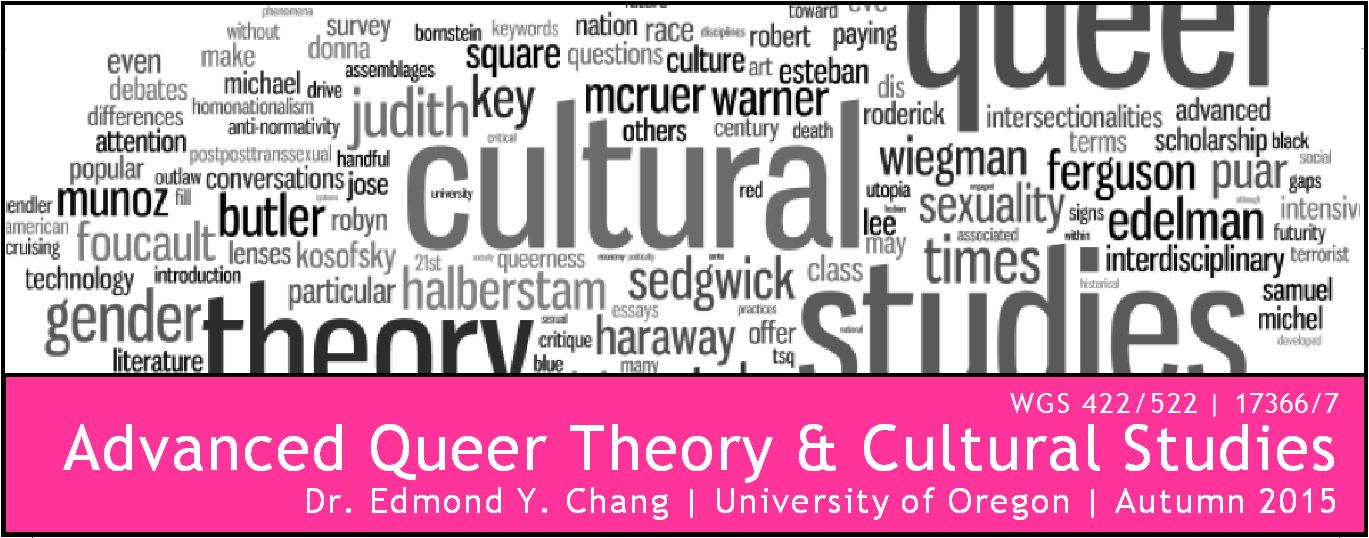Now that I have had a few moments to gather my wits and hit the ground running here at the University of Oregon, I have submitted the following two courses for Autumn quarter. It will be interesting to switch back to the quarter system; I think I will miss semesters. This fall I am teaching WGS 199: Gender and Popular Culture: “Welcome to the Whedonverse” and WGS 422/522: Sexuality Studies: “Advanced Queer Theory and Cultural Studies.” Both courses will count toward the Queer Studies minor in WGS. WGS 422/522 will have both undergraduate and graduate students.
WGS 199: Gender and Popular Culture
“Welcome to the Whedonverse: Feminism, Fandom, and Popular Culture”
MW 12-1:20 PM
Pacific 30
http://edmondchang.com/courses/199/
GEORGE LIPSITZ in “The Case for Studying Popular Culture” argues that “the messages of popular culture circulate in a network of production and reception that is quite serious.” This class will take up the challenge of reading, exploring, critiquing, even creating popular culture through the lenses of scholarship, television, film, and everyday media. Specifically, we will look at the words, works, and fandoms of Joss Whedon–including Buffy the Vampire Slayer, Firefly, Dr. Horrible’s Sing-Along Blog, Much Ado About Nothing, The Avengers, and Marvel’s Agents of SHIELD. Given that Whedon has been praised and criticized for his representations of women and characters of color, this class will unpack and analyze the intersections of cultural formations like race, gender, class, nation, and sexuality in both primary texts and fan cultures.
WGS 422/522: Sexuality Studies
“Advanced Queer Theory and Cultural Studies”
MW 4-5:20 PM
Clinical Services 30
http://edmondchang.com/courses/422/
IN THE INTRODUCTION of the special issue of Social Text entitled “What’s Queer about Queer Studies Now?”, David L. Eng, Judith Halberstam, and José Esteban Muñoz write, “In recent years, scholars in the field have produced a significant body of work…[that insist] considerations of empire, race, migration, geography, subaltern communities, activism, and class are central to the continuing critique of queerness, sexuality, sexual subcultures, desire, and recognition. At the same time, [they] also suggest that some of the most innovative and risky work on globalization, neoliberalism, cultural politics, subjectivity, identity, family, and kinship is happening in the realm of queer studies…[to reevaluate] the utility of queer as an engaged mode of critical inquiry…[to chart] some of the notable historical shifts in the field since its inception while recognizing different pasts, alternative presents, and new futures for queer scholarship.”
THIS ADVANCED CLASS will offer an intensive survey of the key terms, texts, and questions of the interdisciplinary fields that make up queer theory and cultural studies, paying particular attention to recent debates and conversations raised above. Through the lenses of literature, scholarship, new and old media, and even popular culture, we will engage gender, sexuality, race, nation, (dis)ability, technology, and other identities and intersectionalities. Texts may include Michel Foucault, Roderick Ferguson, Judith Butler, Robert McRuer, Jasbir Puar, Eve Kosofsky Sedgwick, Lee Edelman, Samuel Delany, Jose Esteban Munoz, Judith Halberstam, Michael Warner, Donna Haraway, Susan Stryker, Robyn Wiegman, and others.
